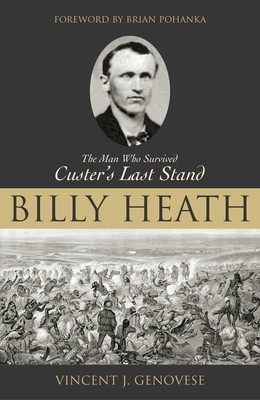
- We will send in 10–14 business days.
- Author: Joan Kennedy Taylor
- Publisher: Prometheus Books
- Year: 2003
- Pages: 232
- ISBN-10: 1591020662
- ISBN-13: 9781591020660
- Format: 16.2 x 23.5 x 1.8 cm, hardcover
- Language: English
- SAVE -10% with code: EXTRA
Reviews
Description
For more than one hundred twenty-five years virtually every history book in print has contended that no white man survived the Battle of the Little Bighorn, where Custer made his famous last stand. This book provides compelling proof that at least one member of the Seventh Cavalry, a man named William Heath, did indeed escape. In this intriguing analysis of hitherto neglected historical documents, Vincent J. Genovese provides verifiable evidence that dispels the long-held myth that none of Custer's soldiers survived the massacre that took place in Montana on June 25, 1876. Genovese chronicles the life of this Lazarus of the Little Bighorn, who joined the army at age 27 after fleeing from Pennsylvania under threats on his life. Documents show that Billy Heath lived in a small coal-mining town in Pennsylvania and that he enlisted in the Seventh Cavalry in 1875, not long before the fateful battle. Further, U.S. Army records verify that he was one of the soldiers at the Little Bighorn. His name also appears on a list of those killed in action and is inscribed on the official monument that stands at the battle site. What makes Genovese's contribution to the history of this famous event so interesting are public records that he here introduces, which show indisputably that William Heath lived on for fourteen more years after the Battle of the Little Bighorn. Birth records from his hometown in Schuylkill County, PA, indicate that he fathered seven children before dying in obscurity. His gravestone still exists in the local cemetery. This is a unique and fascinating re-evaluation of a storied event in American history, which will surely provoke controversy.
EXTRA 10 % discount with code: EXTRA
The promotion ends in 18d.22:29:47
The discount code is valid when purchasing from 10 €. Discounts do not stack.
- Author: Joan Kennedy Taylor
- Publisher: Prometheus Books
- Year: 2003
- Pages: 232
- ISBN-10: 1591020662
- ISBN-13: 9781591020660
- Format: 16.2 x 23.5 x 1.8 cm, hardcover
- Language: English English
For more than one hundred twenty-five years virtually every history book in print has contended that no white man survived the Battle of the Little Bighorn, where Custer made his famous last stand. This book provides compelling proof that at least one member of the Seventh Cavalry, a man named William Heath, did indeed escape. In this intriguing analysis of hitherto neglected historical documents, Vincent J. Genovese provides verifiable evidence that dispels the long-held myth that none of Custer's soldiers survived the massacre that took place in Montana on June 25, 1876. Genovese chronicles the life of this Lazarus of the Little Bighorn, who joined the army at age 27 after fleeing from Pennsylvania under threats on his life. Documents show that Billy Heath lived in a small coal-mining town in Pennsylvania and that he enlisted in the Seventh Cavalry in 1875, not long before the fateful battle. Further, U.S. Army records verify that he was one of the soldiers at the Little Bighorn. His name also appears on a list of those killed in action and is inscribed on the official monument that stands at the battle site. What makes Genovese's contribution to the history of this famous event so interesting are public records that he here introduces, which show indisputably that William Heath lived on for fourteen more years after the Battle of the Little Bighorn. Birth records from his hometown in Schuylkill County, PA, indicate that he fathered seven children before dying in obscurity. His gravestone still exists in the local cemetery. This is a unique and fascinating re-evaluation of a storied event in American history, which will surely provoke controversy.


Reviews